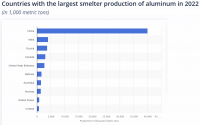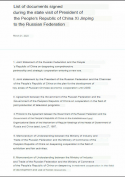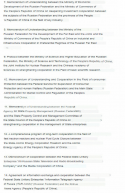It's more about the level of cooperation but also the situation of Russia in the partnership. Clearly Russia have the shorter end of the stick like Canada.copying the post of @gelgoog
i didn't know that.
China is the world's largest producer of aluminium and titanium metal. China is the world's largest miner of titanium dioxide ore..
If China cut supply of titanium the world price for it would spike and it is highly unlikely the West could replace the supply in the short or medium term. Russia is also trying to get Kazakhstan to join it into a titanium producing countries cartel with little success thus far. If both Russia and China press Kazakhstan into it, they will be forced to comply. A titanium metal (sponge) producers cartel of China with the EEU countries of Russia and Kazakhstan would basically totally dominate the market.
Russia is very rich in resources. If it accepts Yuan for its commodities then Yuan will be backed by both Russia’s resources and China’s productivity. I don’t see the point of US dollar hegemony..
You are using an out of date browser. It may not display this or other websites correctly.
You should upgrade or use an alternative browser.
You should upgrade or use an alternative browser.
Miscellaneous News
- Thread starter bd popeye
- Start date
The difference is that Canada use European or US engineering to do most of resource digging or even healthcare. Russia has very high level of internal creativity. it only use resources for exchange.Russia and China look like Canada and the US more and more...
They are restoring Crimea wines and historic architecture without European participation. these are delicate skills not every country alone can do it.

This thing will be unacceptable to Russians unless extensive trials. The anti vaccine information that Russian used to publish was directed at this thing for its pro people. they even want to create Lufthansa elite lounge at Russian airport so that Germans can get Russian vaccines.
I think it’s a short to mid term thing until the BRICs currency will be formalized. This is just my opinion but I don’t think China is interested in pursuing a reserve currency status like the dollar since it has limitations on monetary policy.
When the the US and dollar collapse, yuan become a new global and reserve currency.
Then China can print it out, without losing value, and give it to their citizens to spend, and live of that only, just like the current US.
However, China won't be dumb like the US, it will also probably keep some of its industry, like high tech products with high entry barriers.
Meanwhile, low quality exports requiring artificial yuan value lowering won't be necessary or even desirable then.
Thus, if the yuan becomes the leading currency of the world, China can finally achieve common prosperity.
Just to add, must people don't understand how valuable global currency status is. It literally allows the US to have a high standard and astronomical budgets, without even industrially producing or exporting all that much, without working hard.
That's why the BRICS joint currency will never become a thing, China would want its own currency to be global, India would want its own, etc...
WowI think you're looking in the right direction but not focusing on what is most relevant. It's not the high-paying jobs that are threatened but the wealth of the "job creators" and that translates to the atmosphere of fear that is being created to mobilize and consolidate the population. The jobs themselves are not threatened in the economic sense if national policy doesn't prevent economic optimisation through mergers, buyouts etc. Some of those jobs would be lost but not all. However the owners of capital in this case are fighting for survival and they will whip their underlings into a bloody frenzy to prevent them from thinking about revolts, obstruction or backstabbing.
South Korea is not a country in the same sense that you may think of Japan for example. It is an industrial plantation run by oligarchical clans controlling large amounts of capital. Those clans are called "chaebols" which literally stands for "wealth clan".
Consider:
South Korea has GDP of $2735 billion and population of 51,8 million.
Samsung Group revenue is estimated at approximately 20% of South Korea's GDP of which half is Samsung Electronics with revenue of over $230bn - which is 8,6% of GDP. Hyundai Group revenue is estimated at approximately 8% of GDP. LG Group revenue is estimated at approx. 4,3% of GDP.
Combined these three are equal to a third of South Korea's GDP - close to a trillion USD in value.
These three largest chabols are controlled by three distinct clans:
Additionally the second largest chaebol (as understood in business terms, rather than political/clique terms) is SK Group with 3% of GDP run by Chey Tae-won. AdWhen we add Hanwha and few other major coporations we reach approx. 40% of GDP.
- Lee Byung-chul controlling Samsung
- Chung Ju-yung controlling Hyundai
- Koo In-hwoi controlling LG
Compare:
In Germany which has a similar export-oriented industrial economy the largest company is the VW Group with just over 6% of Germany's GDP. The three largest automotive companies (VW, Daimler, BMW) account for 13,2% of GDP (compared to Samsung Electronics 8,6% and Samsung Group ~20%). Germany also has also a democratic political system with federal structure which adds further protections and the role of labour unions in policy-making on a national level as well as within companies is extensive and protected by law. South Korea is an American-style managed (pseudo)democracy with repression of proper organized labour.
In Japan which has a more similar culture to SK the largest company is Toyota with only 4,6% of GDP and fragmentation of industry is greater. Toyota, Mitsubishi and Honda combined have only 9,3%. German automotive companies can also work with other European companies to support their strategy.
Competition is key because in competitive environments while one actor takes an adversarial stance the other can take a cooperative stance and gain a market advantage over its competitor. Samsung has no meaningful competition (LG is significantly smaller) and therefore it can set the tone for policy.
No other major industrial country has this level of centralization of national economy in so few private hands. Samsung alone has over twice the hypothesised ~10% critical mass for political action. The only other obvious example is... Taiwan and Foxconn's revenue being equal to 20-25% of Taiwan's GDP which should explain a lot.
South Korean chaebols understood politically as cliques run the political system of South Korea in all but name. Combined with lack of genuine society and genuine culture emerging from social activity South Korea is not very different from the totalitarian regime of the North. This is why South Korea is taught to hate China through manipulation of "culture" which is as fake and superficial as their flagship "cultural" products and as centralized as the economy.
Obviously the overall cultural mode of South Korean society which is not dissimilar to American cultural mode (except so much worse) plays an important role but it's largely a headless chicken without the oligarchy directing its emotion. After all when threatened by competition from China South Korea could turn against Japan and target those markets to secure its position. But that can't be done for political reasons so the only direction the oligarchy has left is China.
With regards to these two pictures you need context to draw proper conclusion - unless your goal is to spread misinformation and propaganda narratives.
Serbia's president was forced to come to Washington and was put in this position deliberately as a form of psychological pressure. He did not represent a faction that was allied with that of Trump's or Republicans in general.
Poland's president represents a faction that is allied with the Republicans and Trump and he forced himself to Washington through sheer force of servile enthusiasm and put himself in that position against the protocol and everything that the administration staff suggested. The face of Trump and Duda tells you what they thought of the event.
Also Duda (Poland's president) isn't really a proper president as much as a puppet of the party leader Kaczynski. He is not respected in Poland and doesn't have status that a head of the state should command, even in a parliamentary republic like Poland.
I find the enthusiastic servilism of Duda's and Poland's elites in general to be shameful and repulsive but we should confuse being given a lecture in a principal's office (Serbia) and an obnoxious stalker fangirl forcing herself to your party (Poland).
It's all about unchecked capitalism that is controlled by the very few as discussed on the book "GIANTS: THE GLOBAL POWER ELITE" that came out without much fanfare and exposure back in 2018.
Here's the interview with the author discussing the nature of the arguments you posited here.
Here's the interview with the author discussing the nature of the arguments you posited here.
When the the US and dollar collapse, yuan become a new global and reserve currency.
Then China can print it out, without losing value, and give it to their citizens to spend, and live of that only, just like the current US.
However, China won't be dumb like the US, it will also probably keep some of its industry, like high tech products with high entry barriers.
Meanwhile, low quality exports requiring artificial yuan value lowering won't be necessary or even desirable then.
Thus, if the yuan becomes the leading currency of the world, China can finally achieve common prosperity.
Just to add, must people don't understand how valuable global currency status is. It literally allows the US to have a high standard and astronomical budgets, without even industrially producing or exporting all that much, without working hard.
That's why the BRICS joint currency will never become a thing, China would want its own currency to be global, India would want its own, etc...
is supposedly a thing.
The situation with aluminium is even more lopsided. Remember the panic and price spike of aluminium because of the sanctions on Russia last year? Imagine getting into a trade war with China when world aluminium production looks like this.copying the post of @gelgoog
...
China is the world's largest producer of aluminium and titanium metal. China is the world's largest miner of titanium dioxide ore..
...
Russia is very rich in resources. If it accepts Yuan for its commodities then Yuan will be backed by both Russia’s resources and China’s productivity. I don’t see the point of US dollar hegemony..

If they cut supply of aircraft and aircraft parts to China, then good luck getting titanium and aluminium to make those planes. Especially if China and Russia decide to act together against them.
AssassinsMace
Lieutenant General
But not enough to support its allies or else they wouldn't be whining about supply-chain problems.While I agree with most of the rest of what you said, the West still has Canada and Australia as places to mine, and the US to mention another. The surface of those places isn't insignificant. And it is way easier to mine in Australia than in most places in Russia.
Man being PM of Japan sucks. Not only do you not have real power in your country, you have to waste your time doing this kind of crap at the US's beck and callToday is the second day of talks between Russian President Vladimir Putin and his Chinese counterpart Xi Jinping. After the dialogue, the two presidents are expected to hold a joint press conference, followed by a state dinner at the Kremlin.
More proof that Japan is a vassal of Imperial Washington:


